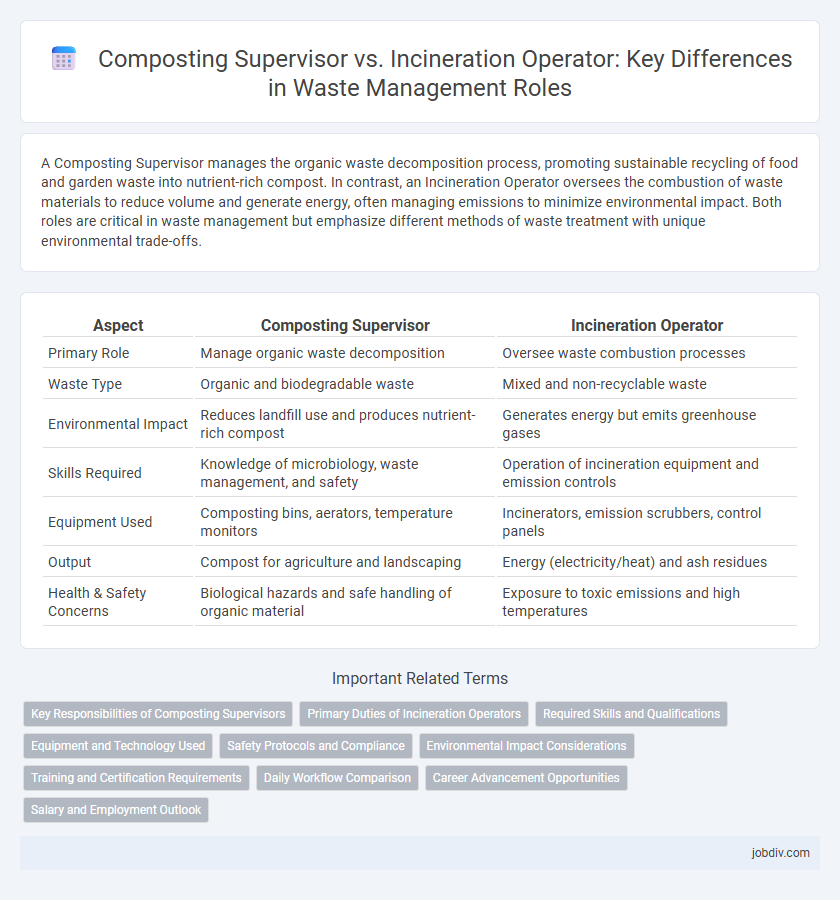A Composting Supervisor manages the organic waste decomposition process, promoting sustainable recycling of food and garden waste into nutrient-rich compost. In contrast, an Incineration Operator oversees the combustion of waste materials to reduce volume and generate energy, often managing emissions to minimize environmental impact. Both roles are critical in waste management but emphasize different methods of waste treatment with unique environmental trade-offs.
Table of Comparison
| Aspect | Composting Supervisor | Incineration Operator |
|---|---|---|
| Primary Role | Manage organic waste decomposition | Oversee waste combustion processes |
| Waste Type | Organic and biodegradable waste | Mixed and non-recyclable waste |
| Environmental Impact | Reduces landfill use and produces nutrient-rich compost | Generates energy but emits greenhouse gases |
| Skills Required | Knowledge of microbiology, waste management, and safety | Operation of incineration equipment and emission controls |
| Equipment Used | Composting bins, aerators, temperature monitors | Incinerators, emission scrubbers, control panels |
| Output | Compost for agriculture and landscaping | Energy (electricity/heat) and ash residues |
| Health & Safety Concerns | Biological hazards and safe handling of organic material | Exposure to toxic emissions and high temperatures |
Key Responsibilities of Composting Supervisors
Composting Supervisors manage organic waste processing by overseeing the decomposition process, ensuring temperature and moisture levels meet regulatory standards, and coordinating staff activities to optimize compost quality. They monitor nutrient cycles and troubleshoot operational issues to maintain environmental compliance and promote sustainable waste management. Their role contrasts with Incineration Operators who focus on thermal destruction of waste, highlighting the supervisor's emphasis on biological treatment and resource recovery.
Primary Duties of Incineration Operators
Incineration Operators are responsible for managing the combustion process that converts waste into energy, ensuring optimal temperature control and emission standards compliance. They monitor equipment performance, conduct routine maintenance, and adjust feed rates to maximize efficiency and minimize environmental impact. Their primary duties include operating incinerators safely, handling waste materials, and maintaining detailed logs of operational data.
Required Skills and Qualifications
A Composting Supervisor requires expertise in organic waste management, knowledge of aerobic decomposition processes, and skills in team leadership and environmental compliance. An Incineration Operator must possess technical proficiency in operating high-temperature combustion equipment, understanding of pollution control technologies, and certifications in hazardous waste handling. Both roles demand strong problem-solving abilities, safety awareness, and adherence to environmental regulations.
Equipment and Technology Used
Composting Supervisors utilize aerated static pile systems, in-vessel composters, and temperature monitoring devices to optimize organic waste decomposition through microbial activity. Incineration Operators manage high-temperature combustion chambers, rotary kilns, and air pollution control technologies such as scrubbers and electrostatic precipitators to efficiently convert waste into energy while minimizing emissions. Both roles require specialized equipment knowledge, but composting emphasizes biological processing technology whereas incineration focuses on thermal treatment and emission control systems.
Safety Protocols and Compliance
Composting Supervisors enforce strict safety protocols related to organic waste handling, including managing bioaerosol exposure and monitoring microbial levels to comply with OSHA standards. Incineration Operators adhere to rigorous emission control regulations, using real-time monitoring systems to ensure compliance with EPA air quality permits and prevent hazardous atmospheric releases. Both roles require comprehensive training in hazardous material handling and emergency response to maintain workplace safety and regulatory compliance.
Environmental Impact Considerations
A Composting Supervisor oversees organic waste decomposition, significantly reducing methane emissions and enhancing soil health through natural nutrient recycling. An Incineration Operator manages waste combustion, which reduces landfill volume but may release pollutants such as dioxins and heavy metals, necessitating strict emission controls. Evaluating environmental impact, composting promotes sustainability by minimizing greenhouse gases, while incineration requires advanced technology to mitigate air quality hazards.
Training and Certification Requirements
Composting Supervisors typically require training in organic waste management, microbiology, and environmental regulations, often leading to certifications such as the Composting Professional Certificate or equivalent industry-recognized credentials. Incineration Operators must undergo rigorous instruction in high-temperature combustion processes, air pollution control, and hazardous waste handling, with certifications commonly including the Certified Wastewater Operator or specific incineration licenses mandated by environmental agencies. Both roles demand comprehensive safety training and compliance with local, state, and federal environmental standards to ensure effective and regulatory-approved waste management.
Daily Workflow Comparison
Composting Supervisors manage organic waste processing by overseeing decomposition cycles, monitoring temperature and moisture levels, and ensuring compliance with environmental regulations to produce nutrient-rich compost. Incineration Operators focus on controlling combustion processes, maintaining incinerator equipment, and monitoring emissions to safely reduce waste volume and mitigate air pollution. Both roles involve rigorous safety protocols but differ significantly in operational focus, with composting emphasizing biological degradation and incineration relying on thermal treatment.
Career Advancement Opportunities
Composting Supervisors typically experience career advancement through roles in environmental management and sustainability consulting, leveraging expertise in organic waste processing to lead larger projects and influence policy development. Incineration Operators advance by moving into plant management or regulatory compliance positions, capitalizing on specialized skills in waste-to-energy technology and emissions control techniques. Both career paths offer growth potential, with composting careers emphasizing ecological impact and incineration careers focusing on operational efficiency and environmental safety.
Salary and Employment Outlook
Composting Supervisors earn an average annual salary of approximately $ Fifty-five thousand, with employment growth projected at 8% over the next decade, reflecting increased demand for sustainable waste management. Incineration Operators typically make around $ Fifty-two thousand per year, facing a stable job outlook with minimal growth due to environmental regulations favoring alternative waste treatments. Job prospects for Composting Supervisors appear stronger as businesses and municipalities prioritize organic waste recycling and environmental sustainability initiatives.
Composting Supervisor vs Incineration Operator Infographic

 jobdiv.com
jobdiv.com